
Volunteers come together in Detroit to give water to locals without it. Photo courtesy We the People of Detroit
Two weeks after it was announced that water would be restored to cut-off Detroiters, thousands still remain unable to wash their hands at home.
Michigan Gov. Whitmer lauded for declaring moratorium on water shut-offs, but it lasts only for the duration of the COVID-9 pandemic
 VOD: The only real solution to the water, housing, transit, mass incarceration, etc. that have devastated the people of Detroit and across the world is replacement of a crumbling system based on profits for the corporations, not the good of the people.
VOD: The only real solution to the water, housing, transit, mass incarceration, etc. that have devastated the people of Detroit and across the world is replacement of a crumbling system based on profits for the corporations, not the good of the people.
THE GANDER
March 27, 2020 7:52 am

Justin Onwenu (LinkedIn photo)
DETROIT, MI — Saturday morning, Justin Onwenu was delivering cases of bottled water to a food pantry in Brightmoor as part of a partnership with We the People of Detroit. He’s been making deliveries like this for a while, and will continue to until water is restored for Detroiters.
Onwenu stressed that he and those he works with are not going door-to-door during the current novel coronavirus COVID-19 crisis, but that the flipside of that is that residents who still don’t have access to water have to go to the churches or food pantries receiving deliveries. Without that water, those Detroiters are extremely vulnerable to the coronavirus.
Wayne County is the hardest-hit region in Michigan. The most suffering is happening in Detroit, where there’s already been 850+ cases and 15 deaths.
Bridge reports that coronavirus is hitting Detroit faster than other large cities in the U.S.
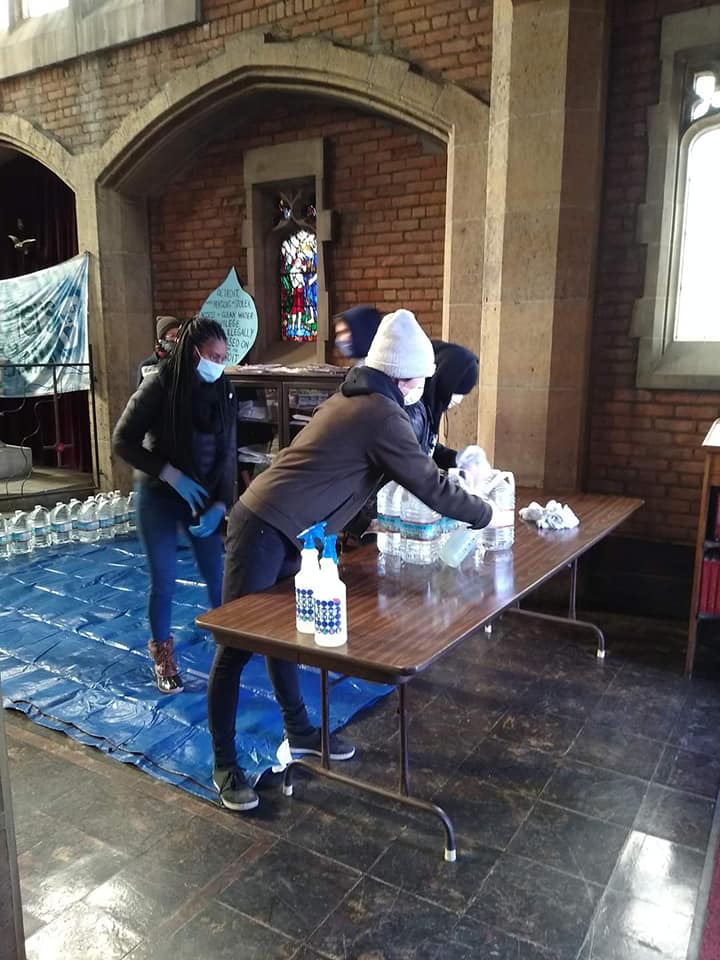
Photo courtesy We the People of Detroit
Water Matters in a Crisis
Hand-washing and social distancing are two essential tools in responding to a pandemic. They play a role in slowing the spread of the coronavirus and “flattening the curve”, reducing the number of sick people added to the stressed healthcare system at any one time. But without access to water at home, going to churches or food pantries to get the water Onwenu delivers is necessary. And hand-washing may be a luxury.
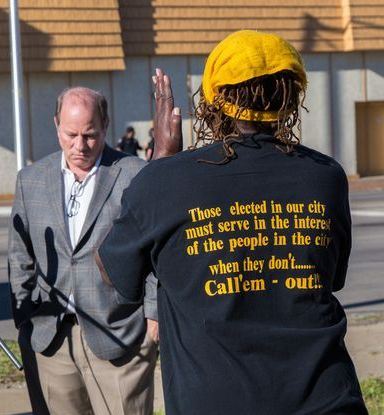
Agnes Hitchcock and Detroit’s Call ’em Out have demanded that Mayor Mike Duggan restore $600 million in over-assessed taxes to Detroit homeowners.
“If you want people to hand wash with soap, then they’ve got to have the water at home to do so,” Michigan Welfare Rights Organization organizer and coalition member Sylvia Orduño told Detour. “We’re on the brink of a serious health outbreak here, because Detroit cannot prepare itself for it.”
The nature of hoarding during the current crisis has made it harder for groups like We the People to get access to cases of water, said Onwenu. As a result of mass panic, many essential supplies like toilet paper and some weirder stuff as reported on social media are being hoarded. That includes bottled water.
It is important to note coronavirus has not been found in drinking water, so tap water is likely just as safe as it was before the pandemic.
 VOD editor–Since the regional corporate takeover of the City of Detroit’s Water and Sewerage Department by the Great Lakes Water Authority in 2014, the water in Detroit and the six surrounding counties has NEVER been safe to drink. See http://voiceofdetroit.net/2017/03/08/do-not-drink-the-water-no-qualified-testers-in-detroit-glwa-crises-cause-ongoing-contamination/.
VOD editor–Since the regional corporate takeover of the City of Detroit’s Water and Sewerage Department by the Great Lakes Water Authority in 2014, the water in Detroit and the six surrounding counties has NEVER been safe to drink. See http://voiceofdetroit.net/2017/03/08/do-not-drink-the-water-no-qualified-testers-in-detroit-glwa-crises-cause-ongoing-contamination/.
Lacking access to clean water is a common problem in developing countries during the current pandemic as explained by the Guardian, but it’s also a problem in Detroit. Onwenu’s most recent delivery came almost two weeks after it was announced that water to Detroiters would be restored, but far too many houses still run dry.
Without Water Two Weeks On
Mayor Mike Duggan and the Detroit Water and Sewage Department (DWSD) announced March 9 that all Detroiters with shut-off water from unpaid bills would have their water restored, and could keep it flowing throughout the coronavirus crisis for $25 per month. Once the crisis ends, Duggan said they could transition to a plan they can afford to end the near six-year water crisis that has been unfolding in Detroit.
 See story below this one for truly comprehensive solution to Detroit’s water crisis, which is a crisis of capitalism: http://voiceofdetroit.net/2020/03/26/time-of-plague-and-meltdownmass-murder-by-corporate-duopoly-black-agenda-report/
See story below this one for truly comprehensive solution to Detroit’s water crisis, which is a crisis of capitalism: http://voiceofdetroit.net/2020/03/26/time-of-plague-and-meltdownmass-murder-by-corporate-duopoly-black-agenda-report/
“About damn time,” tweeted Abdul el-Sayed, former head of the city’s [substitute] health department. “It’s been 6 yrs since the UN declared Detroit water shutoffs an insult to human rights.”
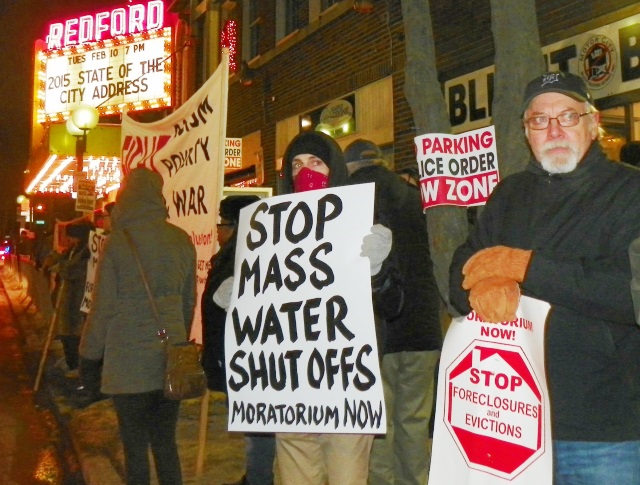
Protesters at Duggan’s State of the City address on Feb. 11, 2015.
But the scale of the problem was too large to resolve overnight. Over 100,000 Detroiters lost water access over the last six years to these shutoffs. More than 2,500 homes in Detroit still lacked access to water when Owenu headed out into Brightmoor on Saturday.
“We are taking this very seriously,” DWSD spokesman Bryan Peckinpaugh told Metro Times. “We didn’t have enough data to know that it would take this long.”
Some problems the city faces in restoring water included having to repair infrastructure like meters and plumbing, and for those issues, the city is contracting plumbers to help speed up the process. But another challenge the city faces is trouble actually communicating with residents without water.
“Is there any continued effort to reach those individuals?” City Council president pro tem Mary Sheffield asked. “My concern is that these are still people who are without water and in the midst of a crisis. I’d love to see without a $25 fee that their water be restored. These are people who are still living in these homes who are probably homeless and don’t want to deal with city government.”
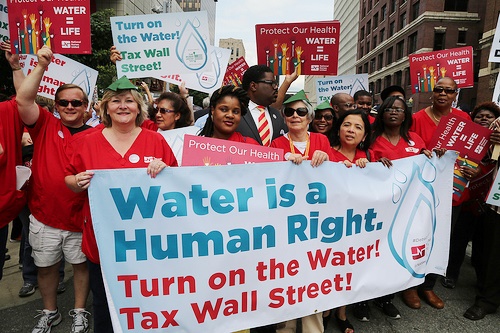
Nurses came from Canada to join in massive march against water shut-offs in downtown Detroit 2015.
This doesn’t surprise Onwenu. He cited concerns from undocumented Detroiters as one roadblock he’s seen in getting water restored — residents afraid that their interaction with DWSD would endanger them because of their undocumented status.
He told the Gander that he expected restoration to take another week or two to see water restored based on his interactions with the city, advocates and residents. Which poses a serious problem for pandemic control.
Onwenu is calling on DWSD and Mayor Duggan to have public locations set aside for people in need of water that can be properly monitored and handled by health officials to slow the spread of the coronavirus.
A National Problem
Water shut-offs are not just happening in Detroit, and are not the only threats to access to clean drinking water. At around the same time as Detroit’s crisis, the infamous Flint Water Crisis was well underway, and it continues to affect both water safety and trust in the government in the city still.
 For real source of Flint’s water crisis, which was unbridled corporate greed involving the private Karegnondi Water Authority, see http://voiceofdetroit.net/2016/02/15/bi-partisan-deal-led-to-flint-water-poisoning-for-profit-the-karegnondi-water-authority-kwa/,
For real source of Flint’s water crisis, which was unbridled corporate greed involving the private Karegnondi Water Authority, see http://voiceofdetroit.net/2016/02/15/bi-partisan-deal-led-to-flint-water-poisoning-for-profit-the-karegnondi-water-authority-kwa/,
Last year, Washington progressives including presidential candidate Senator Bernie Sanders (D-Vermont) introduced the Water Affordability, Transparency, Equity, and Reliability (WATER( Act of 2019.
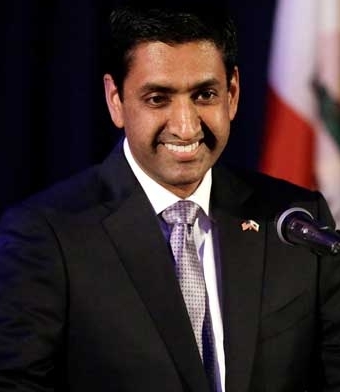
U.S. Rep. Ro Khanna of California.
“Fourteen million U.S. households are struggling to pay for water that too often isn’t even safe to drink,” said Congressman Ro Khanna (D-California) at the time. “Decades of federal underinvestment has left many communities, particularly low-income and minority neighborhoods, with leaky and contaminated water systems. It’s past time that we ensure everyone in this country has access to the most basic human need: clean drinking water.”
Those issues left largely unaddressed on a national level pose the problems present in Detroit to a much, much larger group of Americans. Because of the struggles to keep clean hands and social distance among the water-insecure population, they are both especially vulnerable to the coronavirus and are potential points of risk when it comes to efforts to slow the spread of the virus.
Like many issues, the dangers posed by water insecurity are exposed and heightened by the coronavirus crisis. For now, Onwenu is doing what he can to help and will continue to do so until Detroiters have water restored, undaunted by the coronavirus.
If you’d like to donate water to Detroiters, the We the People website has instructions. If you are a Detroiter without water, call 313-386-9727 to make an appointment.
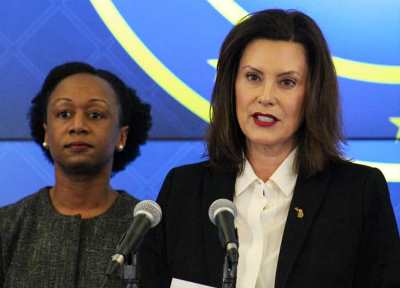
Michigan Gov. Gretchen Whitmer announcing state-wide shelter-in-place order.
Related update:
Gov. Gretchen Whitmer’s Moratorium on Water Shutoffs:
Michigan Governor Gretchen Whitmer announced a moratorium on water shut-offs across the state March 27, for the duration of the COVID-9 pandemic.
However, she earlier rejected proposals for a permanent end to water shut-offs in Detroit, proposed by the Michigan American Civil Liberties Union.
See the following series of stories by Michigan Radio, detailing those proposals:
https://www.michiganradio.org/post/whitmer-order-halts-water-shutoffs-during-virus-pandemic




